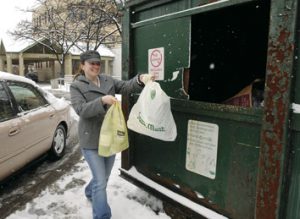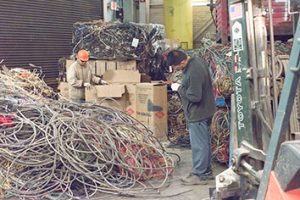Utility offers solar panels for lease to customers
NineStar Connect, a Greenfield-based not-for-profit utility provider, is preparing to unroll a new program allowing customers to begin leasing solar panels.
NineStar Connect, a Greenfield-based not-for-profit utility provider, is preparing to unroll a new program allowing customers to begin leasing solar panels.
The heightened lead levels in the water for North Vermillion High School near Terre Haute and Baugo Community Schools in Elkhart are particularly troubling because of the harmful effects it can have on the development of children.
A hazardous waste site in Indianapolis could be added to the federal Superfund program's priority list that speeds along investigations of contamination sources and eventual cleanups.

About 75 people joined city officials at the Garfield Park Arts Center on Wednesday afternoon for a meeting to discuss ideas for a new citywide recycling program.
A Purdue University horticulturist says Indiana's recent sub-freezing temperatures might have damaged grape vines lured into budding early by March's unseasonable warmth.
Indy Rezone replaces a 1969 version and provides a host of updates addressing more modern urban development.
Hundreds of Indiana miners have lost their jobs in recent months as national demand shrinks due to cheaper natural gas and tougher environmental policies.
The Plainfield-based company, which makes luxury toiletry items for the hotel industry, conducted voluntary recalls of more than 2 million products that were potentially contaminated with harmful bacteria in 2015.
Americans will eat an estimated 54.3 pounds of the red meat this year—the first increase since 2006 and almost a half-pound more per person than in 2015.
Indiana Gov. Mike Pence on Thursday vetoed a bill that would have prevented or delayed state environmental officials from making stricter regulations than federal law.
Currently based in Tennessee, the company plans to build a 200,000-square-foot facility on 40 acres of undeveloped land at the intersection of Interstate 74 and S.R. 44.
City and county officials across Indiana won't be allowed to tax or restrict the use of disposable plastic bags by grocery stores and other retailers under a new state law.
Wealth, technology and relative prices tell us when it makes sense to use a virgin resource from the Earth and when to reuse something.
The nation's 11th largest pork producer has claimed victory after seven years of litigation over an influx of industrial swine farms in east central Indiana.
A not-for-profit farm hopes to contribute more than 500,000 pounds of fresh produce, along with hundreds of pounds of locally raised chicken, pork and beef to feed area residents who struggle to put food on their tables.
The expansion marks the first time Green BEAN has added more than one metro market at a time to its growing service territory.
Dow Chemical Co. said low commodity prices and currency fluctuations will continue to hurt sales to farmers this year, echoing the outlooks of Monsanto Co. and DuPont Co.
Lawmakers have advanced a compromise that seems to appease both small poultry producers who are part of Indiana’s “farm-to-fork” movement and those who say they are worried about protecting public health.

With prices tumbling for scrap metal, used paper and old plastic bottles, recycling firms around Indiana are watching revenue drop. Most are working harder to find buyers that will pay a decent price for their truckloads of materials. Some are idling operations.
A three-year plunge in prices has sent farm income to the lowest in more than a decade and left parts of the Midwest agricultural economy in recession.